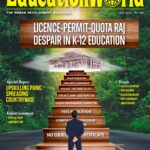NCF FOR SCHOOL EDUCATION 2023: What children should learn
NCF FOR SCHOOL EDUCATION 2023: What children should learn
When the 628 – page ‘pre-draft’ National Curriculum for School Education (NCFSE) 2023 was released on April 6, the Union Education Ministry emphasized that it was made public to solicit feedback from “various stakeholders, including students, parents, teachers, educators, experts, scholars and professionals”.
In response to this appeal, based on the Cover Story written in our August 23 issue (https://www.educationworld.in/national-curriculum-framework-for-school-education-23-comprehensiveroadmap-implementation-challenge) we present EducationWorld feedback to tighten NCFSE 2023.

Curriculum & Pedagogy reforms
- NCFSE is a roadmap for teachers to implement the goals and objectives set out in the National Education Policy 2020. The policy recommends joyous learning through comprehension rather than memorisation and rote. Therefore, the guidelines and provisions of NCFSE should be implemented through experiential learning in which teachers and students learn together.
- NEP 2020 encourages revival of India’s ancient pedagogy of peer-to-peer learning. This should be encouraged by teachers following NCFSE through students learning one-on-one or in clusters.
- NCFSE recommends continuous testing by setting curricular goals and illustrative learning goals. These are important recommendations that teachers should heed.
- NCFSE reiterates that “teachers are at the heart of the practice of teaching”. Therefore to realise the goals of NEP 2020, teachers need to acknowledge the critical importance of their role in the national development effort. In particular, relatively well-remunerated government school teachers need to improve their attendance records and take responsibility for children’s learning outcomes.
- State governments who fund the majority of the country’s 1.2 million government schools need to tighten up their administration of these schools — fill vacancies, ensure full teacher attendance, eliminate multi-grade teaching and provide enabling infrastructure to transform government schools into inviting institutions which children look forward to attending.
Guidelines for teachers

- The shift from chalk-n-talk to inquiry-based, experiential pedagogies is overdue. The country’s 10 million teachers need to break away from memorisation pedagogies to equip children with 21st century thinking and problem-solving skills.
- Intensive and continuous teacher training will be required to implement NCFSE recommended pedagogies.
There is inadequate emphasis on teachers using new digital technologies in the classroom. The final draft should stress that teachers use technology to make teaching-learning engaging and meaningful. - Commendably, the NCFSE 2023 recommends that teachers “value and respect all students, get to know students individually,” listen and observe them carefully and build positive teacher-student relationships. This requires more positive teacher-pupil ratios.
- Again, the emphasis on remedial teaching and differentiated instruction requires improved teacher-pupil ratios.
- NCFSE’s direction to teachers to use varied resources and not overly depend on textbooks is important. Given the predisposition of political parties to rewrite textbooks to reflect their ideological biases, it’s critical for teachers to use textbooks as only one among several resources to achieve curricular objectives.
- Care should be taken that the pedagogical ‘strategies’ and ‘considerations’ prescribed don’t dilute teacher autonomy and flexibility to innovate teaching-learning.
- The framework fails to provide a roadmap as to how the country’s 10 million teachers will be equipped with the skill-sets to implement NCFSE 2023.
- Assessment formats and the exam system need a complete overhaul if teachers are to teach students to learn differently. Therefore, it’s imperative that the national and state examination boards switch from rewarding memorisation skills and assess students’ critical thinking and problem-solving capabilities.
Assessing & testing children

- Prohibiting explicit written tests and exams upto class II is welcome and will discourage several primary schools from imposing formal exams on youngest children.
- Government school teachers, who are assigned census, election duties, etc, are over-burdened. These extra-curricular duties should be withdrawn. Next, the final NCFSE 2023 should include directives for teachers to use contemporary digital technologies for assessment. Moreover, the example of several education institutions to track student progress using artificial intelligence should be replicated.
- The emphasis on continuous evaluation is commendable. The final death exam system should be junked.
The inclusion of arts, physical and vocational education as curricular subjects is welcome. However, assessment guidelines for these disciplines need improvement. Greater autonomy needs to be given to teachers to assess these practical disciplines beyond standardised assessment formats. - Intensive teacher training in new technology-assisted teaching and testing is critical for successful implementation of NEP 2020. The primacy of the teacher needs to be restored.
- The assessment guidelines in NCFSE are suggestive of micro-management. Teacher autonomy, freedom and flexibility for interpreting the curriculum needs to be encouraged to restore the agency of teachers.
- In the secondary stage, greater emphasis and weightage should be given to informal tests, assignments, project work, group activity etc.
Moreover, assessment should cover academic subjects as well as life skills such as creative and critical thinking, and decision-making with weightage also given to extra-curricular activities. Teachers should be given the discretion to enhance academic grades of students who have performed well in non-scholastic activities. - Insufficient attention has been paid to diagnostic assessment which will facilitate diagnosis of every student’s learning needs and development of teaching-learning strategies to enhance academic performance.
- Exam boards should be directed to publish school-leaving board exams results in the public domain. This will enable parents to make better-informed school choices for their children. Also when parents know the average marks of all local schools, low ranked schools will be driven to improve teaching-learning standards to attract and retain students.
- The draft NCFSE 2023 has not addressed the issue of run-away grades inflation by exam boards. The final draft should include directions to national and state exam boards to rationalise and equalise scores.
















Add comment